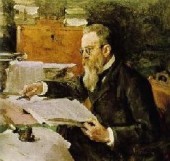Rimsky-Korsakov
Type:
Artist / Band / Musician
Born at Tikhvin, near Novgorod, into an aristocratic family, Rimsky-Korsakov showed musical ability from an early age, but studied at the Russian Imperial Naval College in Saint Petersburg and subsequently joined the Russian Navy. It was only when he met Mily Balakirev in 1861 that he began to concentrate more seriously on music. Balakirev encouraged him to compose and taught him when he was not at sea. (A fictionalized episode of Rimsky-Korsakov's sea voyages forms the plot of the motion picture Song of Scheherazade, the musical score adapted by Miklós Rózsa.) He also met the other composers of the group that were to become known as "The Five", or "The Mighty Handful", through Mily Balakirev. While in the Navy (partly on a world cruise), Rimsky-Korsakov completed his first symphony (1861-1865), which some have deemed the first such piece to be composed by a Russian, but this is not the case (the Russian Anton Rubinstein composed his own first symphony in 1850). Before resigning his commission in 1873, Rimsky-Korsakov also completed the first version of his well known orchestral piece Sadko (1867) and the opera The Maid of Pskov (1872). These three are among several early works which the composer revised later in life.
In 1871, despite being largely group- and self-educated within The Mighty Handful rather than being conservatory-trained, Rimsky-Korsakov became professor of composition and orchestration at the Saint Petersburg Conservatoire. The next year he married Nadezhda Nikolayevna Purgol'd (1848-1919), who was also a pianist and composer. During his first few years at the Conservatory Rimsky-Korsakov assiduously studied harmony and counterpoint in order to make up for the lack of such thorough training during his years with The Mighty Handful.
In 1883 Rimsky-Korsakov worked under Balakirev in the Court Chapel as a deputy. This post gave him the chance to study Russian Orthodox church music. He worked there until 1894. He also became a conductor, leading Russian Symphony Concerts sponsored by Mitrofan Belyayev as well as some programs abroad.
In 1905 Rimsky-Korsakov was removed from his professorship in Saint Petersburg owing to his expressing some political views the authorities disapproved of. This sparked a series of resignations by his fellow faculty members, and he was eventually reinstated. The political controversy continued with his opera The Golden Cockerel (Le Coq d'Or) (1906-1907), whose implied criticism of monarchy upset the censors to the point that the premiere was delayed until 1909, after the composer's death.
Towards the end of his life Rimsky-Korsakov suffered from angina. He died in Lyubensk in 1908, and was interred in Tikhvin Cemetery at the Aleksandr Nevsky Lavra in St. Petersburg. His widow Nadezhda spent the rest of her life preserving the composer's legacy.
Copyright © BANDMINE // All Right Reserved
